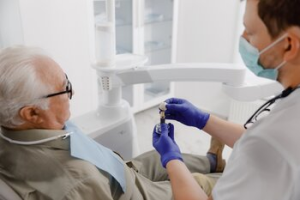Cheapest Dental Implants in Australia: What You Should Know

If you are missing teeth or struggling with ill-fitting dentures, the solution might be simpler and more affordable than you think. Dental implants have revolutionised the field of restorative dentistry, providing a permanent, comfortable solution for missing or damaged teeth.
While this procedure might be an investment, it’s important to realise that quality should never be compromised when it comes to oral health. Let’s explore the cheapest dental implants in Australia and understand what you need to know about the procedure, cost, and benefits.
Understanding Dental Implants
Dental implants are artificial tooth roots consisting of biocompatible materials, typically titanium. They are surgically installed into the jaw, providing a secure anchor for replacement teeth. Whether you need to replace single or multiple teeth or require full-mouth dental implants, this innovative treatment can restore your smile and enhance oral health.
Types of Dental Implants and Their Costs
The dental implant treatment you need will vary depending on the number of teeth you are missing and their location. Each type has a different cost associated:
- Single Tooth Implants: If you’re missing a single tooth, a single mouth implant is placed in the gap. This is followed by attaching a custom-made crown to the implant, providing a natural look and feel.
- Multiple Tooth Implants: An implant-supported bridge is a cost-effective solution for missing adjacent teeth. Fewer implants are needed than single tooth implants for each gap, reducing costs.
- Full Mouth Dental Implants: If you have lost all your teeth due to disease, injury, or decay, full-mouth dental implants offer a comprehensive solution. They replace the entire set of teeth with implant-supported dentures or bridges, providing a durable, natural-looking alternative to traditional dentures.
Understanding the Dental Implant Procedure
 The dental implant procedure is extensive, which can contribute to the overall cost. The procedure typically includes the following stages:
The dental implant procedure is extensive, which can contribute to the overall cost. The procedure typically includes the following stages:
- Initial Consultation: This is the first step, where the dentist evaluates your oral health, takes X-rays, and plans the implant procedure. This appointment may also involve basic tooth extraction if necessary.
- Implant Placement: The dentist places the implant into your jaw bone during surgery. Anaesthesia is used to ensure your comfort throughout the process.
- Osseointegration: This is the healing period where the implant fuses with the bone through osseointegration. This phase can take several weeks or even months but is crucial for the implant’s stability.
- Abutment Placement: An abutment is attached after the implant fuses with the bone. The abutment is a connector between the implant and the artificial tooth.
- Artificial Tooth Placement: The last step is the placement of the fake teeth. These can be crowns, bridges, or dentures custom-made in a dental laboratory to match the shade of your remaining natural teeth.
Factors Affecting Dental Implant Cost in Australia
Although it’s important to seek out affordable dental implants, it’s equally crucial to understand the variables that determine the overall cost of this treatment. It’s not simply about replacing a missing tooth; it’s a comprehensive process involving pre-treatment evaluation, the actual implant procedure, and follow-up care.
Pre-Treatment Assessment and Planning
Every dental implant journey begins with a thorough dental and medical evaluation. The dentist checks for oral health problems such as gum disease and tooth decay. If such issues are found, they must be addressed before proceeding with the implant treatment, adding to the cost.
Additionally, the dentist assesses the condition of your jaw bone. A healthy, dense jaw bone is crucial for the successful placement of dental implants. In some cases, patients may have suffered bone loss due to long-term tooth loss, gum disease, or ageing.
If the bone density is insufficient, the dentist may recommend a bone grafting procedure or a sinus lift to increase the chances of successful implant integration. These additional procedures will also add to the total cost.
The Complexity of the Case
The complexity of the dental implant procedure significantly influences the cost. Some patients may require a single dental implant, while others may need multiple tooth implants or full-mouth dental implants. More complex cases involving multiple teeth naturally require more time, materials, and potentially more visits to the dental practice, thus increasing the cost.
Quality of Materials Used
The type of materials used in your dental implant procedure, from the implant itself to the abutment and artificial tooth, can significantly impact the overall cost. High-quality dental implants are often made from biocompatible materials like titanium or ceramic. While these materials cost more, they also last longer, reducing the likelihood of future replacement costs.
Similarly, the quality of the artificial tooth or crown also matters. Those made from high-grade materials such as porcelain or composite resin offer a more natural look and feel, and they are more durable and stain-resistant. However, they come at a higher price than less expensive materials.
Geographical Location
The location is also a major cost-determining factor when it comes to dental implants. Prices can differ greatly from one city to another and even from one dental practice to another within the same city. Dental practices in metropolitan areas with a high cost of living charge more than those in less populated regions.
Aftercare and Maintenance
Proper care and maintenance of dental implants can save patients from potential complications and additional costs down the line. This includes frequent dental check-ups and cleanings, which should be factored into the overall cost. Moreover, a good oral hygiene routine at home, including brushing, flossing, and using mouthwash, is essential to prolong the lifespan of the implants.
Why Invest in Dental Implants?
 Despite the initial cost, dental implants are considered a worthwhile investment for several reasons:
Despite the initial cost, dental implants are considered a worthwhile investment for several reasons:
- Improved Oral Health: Dental implants function like natural teeth, allowing you to maintain oral hygiene without special care. They also prevent bone loss, which can occur when you have missing teeth.
- Enhanced Comfort: Unlike poorly fitting dentures, dental implants are anchored into the jaw bone, eliminating discomfort and improving your eating and speaking abilities.
- Durability: With proper care, teeth implants can last practically forever, making them an affordable treatment in the long run.
- Improved Aesthetics: Dental implants mimic the aesthetics and functioning of real teeth. They can significantly improve your smile and boost your self-confidence.
How to Find Cheap Dental Implants
While the term “cheap dental implants” might sound appealing, it’s essential to approach this with caution. A low cost might indicate poor quality dental implant material, inexperienced dentists, or questionable infection control. When looking for the cheapest dental implants in Australia, consider the following:
- Do Your Research: Look for transparent dental practices about their pricing and procedures. Check for patient reviews and testimonials. Ensure the clinic is clean and the dentists are experienced and certified.
- Consult Multiple Dentists: Costs can vary between dental practices, so consulting with multiple dentists is beneficial. This can help you understand the treatment plan better and allows you to compare costs.
- Explore In-House Financing Options: Some dental practices offer in-house finance options, making dental implant treatment more accessible. These options allow you to spread the cost over a specified period, making the treatment more affordable.
How Insurance Can Help With Dental Implants Cost
The cost of dental implants can significantly reduce if you have the right dental insurance policy. Some Australian health funds cover dental implants under the ‘Major Dental’ category. It’s always advisable to check with your health fund to confirm your level of coverage.
However, remember that most policies have waiting periods, usually up to 12 months, before you can claim for major dental procedures. Additionally, policies also have yearly limits. This means that even though your insurance covers dental implants, you may still need to pay some of the costs out of your pocket if the procedure cost exceeds your policy’s limit.
Therefore, when trying to mitigate the costs of dental implants, do consider your insurance coverage. If you don’t currently have a policy covering dental implants, it may be worth considering an upgrade, especially if you foresee extensive dental work. Understanding the intricacies of your insurance policy can help you manage your expenses more effectively.
While the initial costs of dental implants seem steep, their long-term health benefits make them a cost-effective choice. So, take the time to evaluate your options thoroughly before deciding on a dental treatment plan.
Additional Dental Implant Costs
While the dental implant, abutment, and artificial tooth constitute the main cost of the implant treatment, some additional costs can come up during the process:
- Bone Grafting: Not all patients have enough healthy bone to support dental implants. In such cases, a bone graft is required, where new bone is added to the area of your jaw that will hold the implant.
- Sinus Lift: A sinus lift is another procedure that might be necessary for some patients. This involves adding bone below the sinus if the natural bone has deteriorated because of the missing upper back teeth.
- CT Scans: In some cases, the dentist might require a CT scan to get a detailed view of your mouth. This scan helps the dentist plan the dental implant’s placement accurately.
- Temporary Dentures: If the area of the implant is visible, you may opt for a temporary denture for aesthetic purposes during the healing process.
Maintenance and Care of Dental Implants
 While dental implants are meant to last decades, proper care and regular dental check-ups can ensure longevity. Here are some key points to remember for implant care:
While dental implants are meant to last decades, proper care and regular dental check-ups can ensure longevity. Here are some key points to remember for implant care:
- Oral Hygiene: Brush and floss regularly, just as you would with natural teeth. Consider using interdental brushes or water flossers that can clean around the implants more effectively.
- Avoid Hard Foods: Chewing hard items such as ice or hard candy can break both natural teeth and the crowns on your dental implants.
- Regular Check-ups: Regular dental check-ups are vital in maintaining your dental implants. It allows your dentist to check the implants and assess if they’re working correctly and that there is no sign of infection or other issues.
Dental implants may be more expensive initially than other tooth replacement options, but their durability and life-like appearance make them cost-effective.
Investing in Your Oral Health
While searching for the cheapest dental implants in Australia is understandable, remember that cost is just one factor to consider. Focusing on the value you’re getting for your money is crucial. Dental implants can last forever, providing a cost-effective, long-term solution for missing teeth when properly placed and maintained.
Take the time to research, ask questions, and consult with experienced dentists before making your decision. Dental implants don’t just replace missing teeth; they restore confidence, improve oral health, and enhance your quality of life.
The Importance of Choosing the Right Dentist
Regardless of how affordable dental implants might seem, the choice of a dentist remains a pivotal aspect in determining the overall success of the treatment. An experienced dentist brings years of training and expertise to the table, providing better procedural precision, which is crucial to prevent potential implant failures, complications, and additional costs.
It’s essential to find a dentist who specialises in implantology and who has a successful track record in performing dental implant procedures. You can verify this by searching for their qualifications, asking about their experience, or even requesting to see before and after photos of previous patients. A dentist who is open and transparent about these things is usually a good choice.
Additionally, ensure that the dental practice maintains high hygiene standards and follows the Australian Dental Association’s guidelines. Poor hygiene practices can lead to questionable infection control, potentially leading to complications post-dental implant surgery.
Final Thoughts
While finding the cheapest dental implants in Australia might be your goal, remember that your oral health is paramount. To avoid future dental problems and additional costs, ensure to balance cost and quality.
Dental implants are a worthwhile, lifetime investment in your smile and your quality of life. My Local Dentists offers affordable, high-quality dental implant procedures performed by our experienced dentists. We’re here to guide you through the process, providing clear pricing and flexible financing options.
Want to renew your self-confidence with dental implants? Schedule a consultation with our team at My Local Dentists today, and take the first step towards a healthier, more confident smile.
Note: Any surgical or invasive procedure carries risks. Before proceeding, you should seek a second opinion from an appropriately qualified health practitioner.
References:
https://www.perio.org/for-patients/periodontal-treatments-and-procedures/dental-implant-procedures/
https://www.ncbi.nlm.nih.gov/books/NBK470448/
http://pmiaustraliaconference.org.au/the-complete-guide-to-dental-implants-cost-in-australia/
